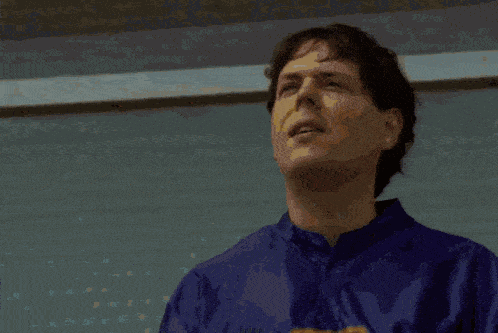the Wall in Solar Opposites.
Ask Lemmy
A Fediverse community for open-ended, thought provoking questions
Rules: (interactive)
1) Be nice and; have fun
Doxxing, trolling, sealioning, racism, and toxicity are not welcomed in AskLemmy. Remember what your mother said: if you can't say something nice, don't say anything at all. In addition, the site-wide Lemmy.world terms of service also apply here. Please familiarize yourself with them
2) All posts must end with a '?'
This is sort of like Jeopardy. Please phrase all post titles in the form of a proper question ending with ?
3) No spam
Please do not flood the community with nonsense. Actual suspected spammers will be banned on site. No astroturfing.
4) NSFW is okay, within reason
Just remember to tag posts with either a content warning or a [NSFW] tag. Overtly sexual posts are not allowed, please direct them to either [email protected] or [email protected].
NSFW comments should be restricted to posts tagged [NSFW].
5) This is not a support community.
It is not a place for 'how do I?', type questions.
If you have any questions regarding the site itself or would like to report a community, please direct them to Lemmy.world Support or email [email protected]. For other questions check our partnered communities list, or use the search function.
6) No US Politics.
Please don't post about current US Politics. If you need to do this, try [email protected] or [email protected]
Reminder: The terms of service apply here too.
Partnered Communities:
Logo design credit goes to: tubbadu
Homer’s Odyssey.
Most modern adaptations present the stories Odysseus tells while visiting the Phaeacians as if they were the actual plot—but Homer’s audience would have known Odysseus as a notorious liar and trickster and wouldn’t necessarily have regarded his stories as true even within the context of the frame narrative. Homer’s epic focuses as much on the parallel stories of Telemachus and Penelope—I read the underlying story as their struggle to untangle Odysseus from his own web of deceptions and fantasies and bring him back to reality.
This is not exactly what you're asking for (media inside media), but it's really close in spirit (nested narratives), and I really like it: a book written in Portuguese in the XIX century, called Noite na Taverna (Night in the Tavern).
The book has an overarching story of friends telling each other stories in a tavern, over booze; with all those nested stories being about love, despair, and death (it has a strong gothic vibe).
And, as each character tells the others a story, there's always that fishy smell that the story might be actually bullshit; and other characters do raise some doubts about its in-universe veracity (like Bertram does to Solfieri). And you, as the reader, do the same - but in no moment you question the veracity of the overarching story, and you feel like you're inside the tavern alongside the drunkards.
So it's a lot like the author is toying with your suspension of disbelief - redirecting it from the overarching story to the nested stories, and as you doubt the later you get even more immersed into the former.
If I must use an example of media within media, then my choice would be "The Book" within Orwell's 1984. I think that it's a great piece because it shows Orwell's views on politics and society, while still serving narrative and worldbuilding purpose - for Winston it's a material proof of the Inner Party's bullshit, for O'Brien it's a tool of the Inner Party to sniff out dissidence. (Note: 1984 is extremely misrepresented nowadays, I'm aware, but I still like it.)
Threshold Kids in the Video game control it was a kids TV series to teach kids in the game about the FBC it was kinda bonkers
Just saw "The Play That Goes Wrong," and it is a two hour masterpiece of a play within a play.
I see videos of complete productions on youtube. Go watch one.
I just stated watching The Goes Wrong Show on Amazon. Not sure if I would appreciate more than 1 episode a night, but the first one had me laughing so hard I couldn't breathe.
The “Busty Asian Beauties” running gag in supernatural. Was a magazine, website etc. Always gave me a chuckle.
"Ow, My Balls" is a claaaassic.
"The Deb of Night" radio show from Vampire: The Masquerade - Bloodlines is consistently hilarious and a great way to relax between the more horrific parts of the game. Bonus points for one of the regular callers guessing the plot of the game by complete chance and one of the main villains calling in to threaten whoever might be listening.
In "day of the tentacle" Bernard could walk up to the computer and play the game preceding day of the tentacle. That was nice.
Sick Sad World from Daria. I'd love that show
I'm a big fan of fake brands/products in anime. I don't know why, but they bring me joy.

"S." by Doug Dorst is in itself a fake novel, where the "real" story takes place as handwritten notes in the margins to form the complete story, the fake novel itself just a prop. But reading the novel-within-a-novel-that-is-the-novel "Ship of Thesus" by itself is an interesting short surreal read.
Gotta love The Rise and Fall of Sanctuary Moon from The Murderbot Diaries.
Invitation To Love the soap opera that a lot of residents of Twin Peaks, especially Nadine, seemingly adored.
Seven on 7 is a series of TV news shorts and commercials from The Boys universe. It's a delightful little parody of Fox News. The whole series is available free on YouTube.
Crash Nebula and The Crimson Chin from Fairly Oddparents are both great
Sweet Bro and Hella Jeff from Homestuck. Although it actually predates Homestuck and was retroactively converted into media-within-media, does that still count?
Interdimensional TV on Rick and Morty
Watched Asteroid City recently for the first time. I thought the play within the movie (and the intertwining back and forth of storylines) was really interesting and entertaining.
"Address Unknown", a twilight zone/detective noir tv show within the universe of Max Payne.
McGarnigle from the Simpsons
Binky the Clown and The Buddy Bears from Garfield and Friends
Reptar from Rugrats
Black Mirror. News tickers and headlines discuss other world-building stories from different episodes.
The poems of Thomas Zane in the old gods of asgard concert in the book about max Payne in the video game Allen wake in the video game control in the amazing TV series the threshold kids in that song the janitor is singing.
... Pretty sure that's the continuity.
Wheel! Of! Fish!
